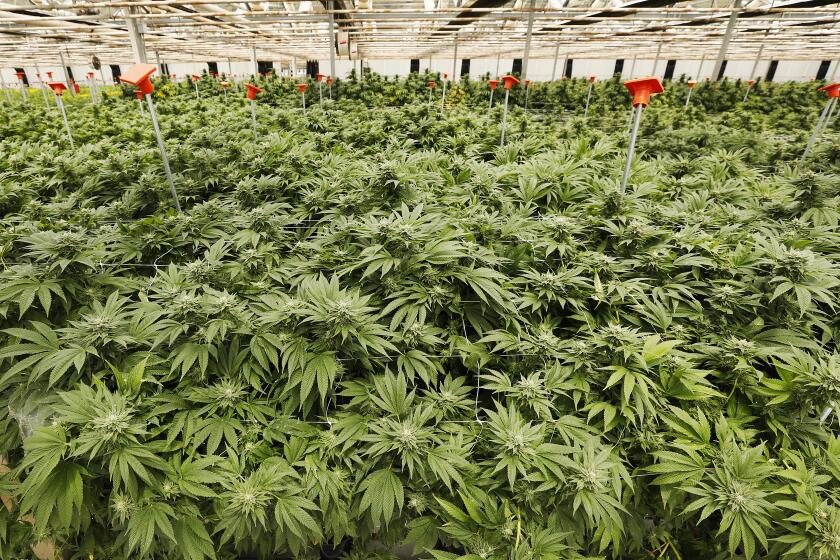As illegal marijuana farms invade desert communities, officials reconsider cannabis regulations
- Share via
Faced with an invasion of massive, illegal pot farms in California’s high desert, Los Angeles County Supervisors have voted to boost enforcement and reconsider their current ban on commercial marijuana cultivation.
The move Tuesday follows months of complaints from residents and authorities who say the large-scale black market farms have upended life in the desert. Authorities say the boom has led to forced labor, violence, water theft and the destruction of fragile desert habitat and wildlife. Longtime residents say they feel less safe, claiming black-market growers act with impunity by carrying weapons, trading gunfire with rivals and threatening those who wander too close to their farms.
The supervisors voted 5-0 at this week’s meeting to reconsider the ban on commercial cannabis production and distribution in unincorporated L.A. County. Supervisors also approved a motion asking county attorneys and state officials to devise a plan to civilly prosecute water thieves and increase local government controls over illegal cannabis and unregulated hemp.
“Organized crime is still alive and well in the United States, in California and in wanting to really corner this market,” said Supervisor Sheila Kuehl, who coauthored one of the motions.
Illegal marijuana grows have exploded across the California desert, along with forced labor, ecological destruction and fear
The motion also dedicated $250,000 to further crackdowns by the Los Angeles County Sheriff’s Department.
Over the past two months, the department has spent more than $1 million in manpower and resources to crack down on about 40% of the grows, according to Sheriff Alex Villanueva.
The penalty for growers remains a misdemeanor however, and Villanueva admitted in a news conference earlier this month that those arrested in a large bust were already trying to rebuild their farms.
Barger, whose massive 5th District covers much of northern L.A. County, said environmental degradation was as much a concern as water theft and resident safety.
Growers have used bulldozers to clear desert areas, piling up Joshua trees and other native plants, and have sprayed pesticides that are toxic to wildlife.
Los Angeles will be the biggest beneficiary of the money, which was proposed by Gov. Gavin Newsom to help cannabis businesses acquire permanent licenses.
Two bear carcasses were recently found near marijuana grows. Authorities say the animals were killed by pesticides.
“If it’s killing our wildlife, imagine what it’s doing to those that come in contact with it once it’s put on the market up for sale,” Barger said of the illegally grown marijuana.
When Californians voted to legalize adult recreational marijuana five years ago, Los Angeles County officials were hesitant about how to move forward.
Proposition 64 decriminalized marijuana use statewide, but left it up to cities and counties to decide whether to allow retail production and distribution in their jurisdictions.
The L.A. County Board of Supervisors decided to prohibit commercial cannabis production and distribution on unincorporated lands while they studied the matter. An advisory group spent months developing a report with 64 recommendations on how the county should move forward. The supervisors decided to take no action.
Over the next few years, unpermitted dispensaries and illegal marijuana grows have popped up across unincorporated L.A. County, facing few consequences as angry residents clamor for change. County leaders had taken no major steps toward regulating cannabis — until Tuesday, when they called for several county departments to revisit their 2017 report and collaborate on next steps.
Supervisor Janice Hahn, who authored the motion, said that in 2017, the supervisors enacted the ban “to buy us some time to figure out all the details.” She was still unsure when the advisory group’s report came out.
“I admit there were just still too many questions and too many uncertainties, and I didn’t want to rush the process before we were ready,” Hahn said.
Hahn’s hesitancy in 2017 foreshadowed what was to come.
As the supervisors discussed the ordinance barring cannabis production and distribution then, Hahn asked how county staff would navigate enforcement.
“It’s one thing to have a neighbor who might have seven plants, as opposed to six,” Hahn said, referencing the legal limit for growing marijuana plants indoors for personal use. “It’s another thing for our county staff to arrive on a scene that is much bigger and scarier than someone who is just personally cultivating cannabis for personal use. Could be a whole operation. There could be dangerous weapons involved.”
More to Read
Sign up for Essential California
The most important California stories and recommendations in your inbox every morning.
You may occasionally receive promotional content from the Los Angeles Times.












